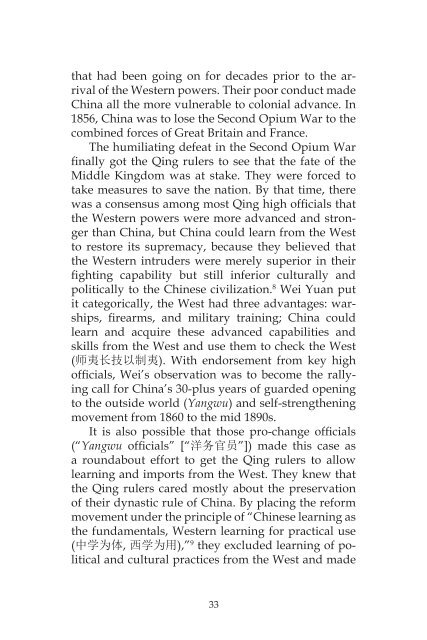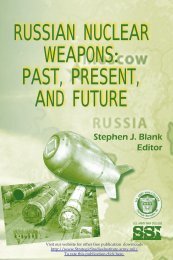The United States and China in Power Transition - Strategic Studies ...
The United States and China in Power Transition - Strategic Studies ...
The United States and China in Power Transition - Strategic Studies ...
You also want an ePaper? Increase the reach of your titles
YUMPU automatically turns print PDFs into web optimized ePapers that Google loves.
that had been go<strong>in</strong>g on for decades prior to the arrival<br />
of the Western powers. <strong>The</strong>ir poor conduct made<br />
<strong>Ch<strong>in</strong>a</strong> all the more vulnerable to colonial advance. In<br />
1856, <strong>Ch<strong>in</strong>a</strong> was to lose the Second Opium War to the<br />
comb<strong>in</strong>ed forces of Great Brita<strong>in</strong> <strong>and</strong> France.<br />
<strong>The</strong> humiliat<strong>in</strong>g defeat <strong>in</strong> the Second Opium War<br />
f<strong>in</strong>ally got the Q<strong>in</strong>g rulers to see that the fate of the<br />
Middle K<strong>in</strong>gdom was at stake. <strong>The</strong>y were forced to<br />
take measures to save the nation. By that time, there<br />
was a consensus among most Q<strong>in</strong>g high officials that<br />
the Western powers were more advanced <strong>and</strong> stronger<br />
than <strong>Ch<strong>in</strong>a</strong>, but <strong>Ch<strong>in</strong>a</strong> could learn from the West<br />
to restore its supremacy, because they believed that<br />
the Western <strong>in</strong>truders were merely superior <strong>in</strong> their<br />
fight<strong>in</strong>g capability but still <strong>in</strong>ferior culturally <strong>and</strong><br />
politically to the Ch<strong>in</strong>ese civilization. 8 Wei Yuan put<br />
it categorically, the West had three advantages: warships,<br />
firearms, <strong>and</strong> military tra<strong>in</strong><strong>in</strong>g; <strong>Ch<strong>in</strong>a</strong> could<br />
learn <strong>and</strong> acquire these advanced capabilities <strong>and</strong><br />
skills from the West <strong>and</strong> use them to check the West<br />
(师夷长技以制夷). With endorsement from key high<br />
officials, Wei’s observation was to become the rally<strong>in</strong>g<br />
call for <strong>Ch<strong>in</strong>a</strong>’s 30-plus years of guarded open<strong>in</strong>g<br />
to the outside world (Yangwu) <strong>and</strong> self-strengthen<strong>in</strong>g<br />
movement from 1860 to the mid 1890s.<br />
It is also possible that those pro-change officials<br />
(“Yangwu officials” [“洋务官员”]) made this case as<br />
a roundabout effort to get the Q<strong>in</strong>g rulers to allow<br />
learn<strong>in</strong>g <strong>and</strong> imports from the West. <strong>The</strong>y knew that<br />
the Q<strong>in</strong>g rulers cared mostly about the preservation<br />
of their dynastic rule of <strong>Ch<strong>in</strong>a</strong>. By plac<strong>in</strong>g the reform<br />
movement under the pr<strong>in</strong>ciple of “Ch<strong>in</strong>ese learn<strong>in</strong>g as<br />
the fundamentals, Western learn<strong>in</strong>g for practical use<br />
(中学为体, 西学为用),” 9 they excluded learn<strong>in</strong>g of political<br />
<strong>and</strong> cultural practices from the West <strong>and</strong> made<br />
33

















